| |
|
|
51.
| Deconstruction Structure 01 |
| |


2014-2015, structure in steel, 3 videos, typewriter, hammers, A4 typed sheets.
Exhibition view of Permanent Exiles, Mamco, 2015, Geneva.
Courtesy of the artist and Ceysson & Bénétière, Paris.
Ed. of 5 + 1 A.P.
With this series of works, mounir fatmi questions his own artistic journey, explores its foundations and reflects upon its implications.
Studio Fatmi, August 2017
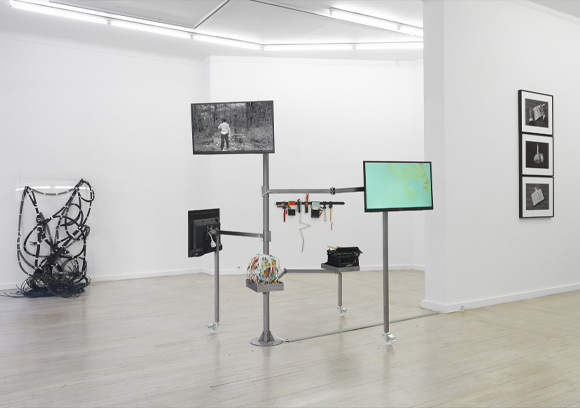
Deconstruction Structure 04
Exhibition view from The White Matter, Ceysson & Bénétière, 2019, Paris.
Courtesy of the artist and Ceysson & Bénétière, Paris.
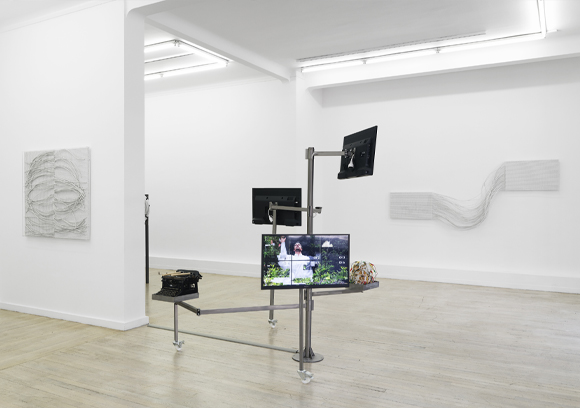
Deconstruction Structure 04
Exhibition view from The White Matter, Ceysson & Bénétière, 2019, Paris.
Courtesy of the artist and Ceysson & Bénétière, Paris.
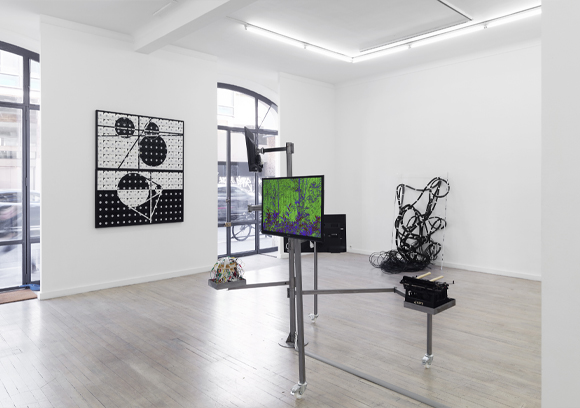
Deconstruction Structure 04
Exhibition view from The White Matter, Ceysson & Bénétière, 2019, Paris.
Courtesy of the artist and Ceysson & Bénétière, Paris.
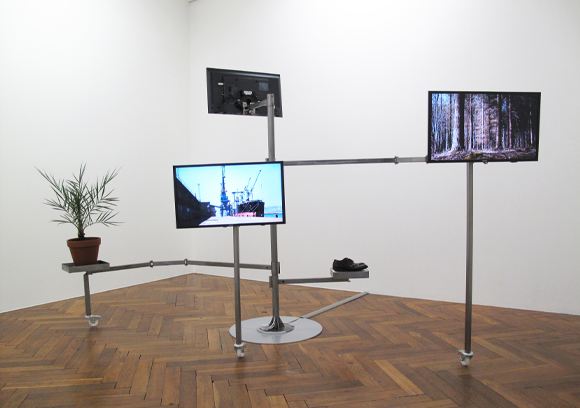
Deconstruction Structure 03
Exhibition view of D'une méditerranée, l'autre, Hotel des Arts, 2016, Toulon.
Courtesy of the artist and Ceysson & Bénétière, Paris.
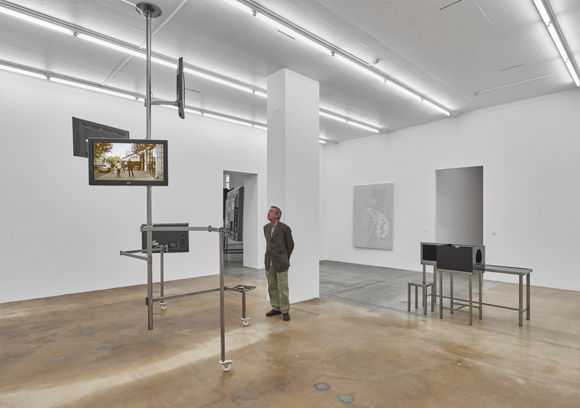
Deconstruction Structure 02
Exhibition view of Permanent Exiles, MAMCO, 2015, Geneva.
Courtesy of the artist and Ceysson & Bénétière, Paris.
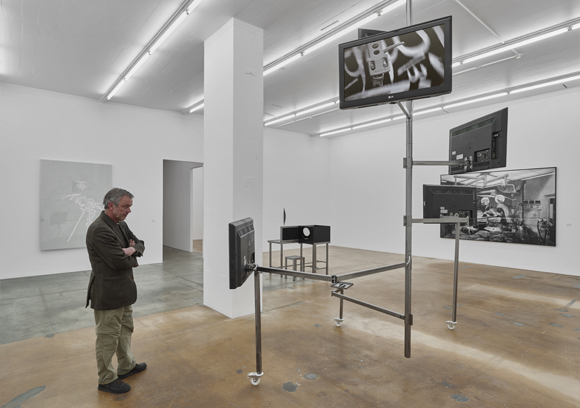
Deconstruction Structure 02
Exhibition view of Permanent Exiles, MAMCO, 2015, Geneva.
Courtesy of the artist and Ceysson & Bénétière, Paris.
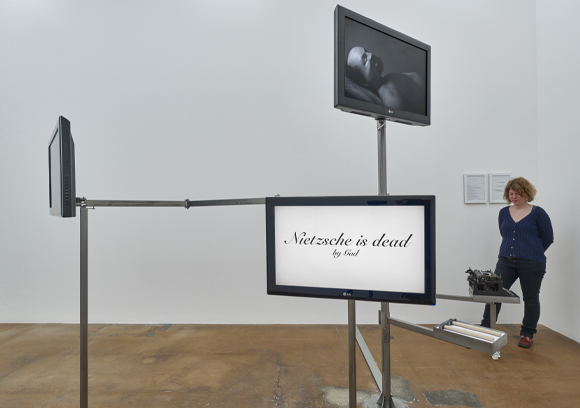
Deconstruction Structure 01
Exhibition view of Permanent Exiles, MAMCO, 2015, Geneva.
Courtesy of the artist and Ceysson & Bénétière, Paris.
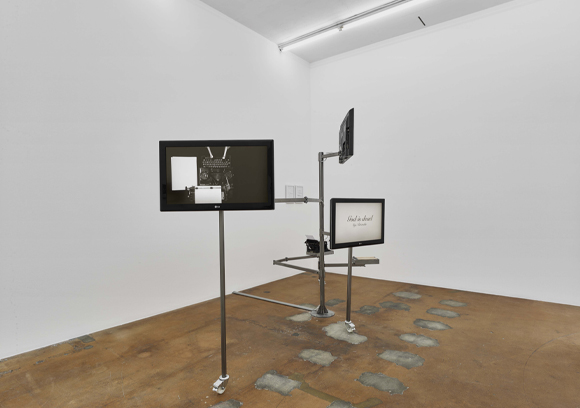
Deconstruction Structure 01
Exhibition view of Permanent Exiles, Mamco, 2015, Geneva.
Courtesy of the artist and Ceysson & Bénétière, Paris.
|
|
|
|
|
|
|
Deconstruction structure N°1 :
- History is not mine, 2013, France, 5 min, HD, couleur, stéréo
- God is Dead, 2007, France, 3 min 32, HD, N&B.
- Sleep Al Naim, 2005-2012, France, 26 minutes, HD, N&B, stéréo.
- Machine à écrire, papier, marteaux
Le projet d'installations Déconstruction - Structure échafaude une série de compositions métalliques mobiles, aux formes variées. Les structures sont équipées de roulettes et munies de plusieurs bras au bout desquels se trouvent des écrans de télévision ou des enceintes sonore diffusant des œuvres réalisées par Mounir Fatmi, ainsi que des objets tirées d'œuvres ancienne ou récentes et appartenant à divers médias, sculptures, installations ou performance.
Avec cette série d'œuvres, Mounir Fatmi interroge son propre cheminement artistique, en explore les fondements et questionne ses enjeux. Il examine ainsi le processus de création en recensant les thèmes abordés couramment dans ses œuvres : le rapport de l'individu à l'histoire, aux pouvoirs et à la société, les croyances, l'éducation et le langage, les interactions culturelles et le voyage, la liberté d'expression et les rapports de l'art et de la pensée critique aux pouvoirs politiques et religieux. Il tient compte également de la diversité des sources d'inspiration : artistiques, philosophiques, linguistiques, et de la multiplicité des formes employées. Il associe enfin et met en rapport les diverses stratégies artistiques élaborées tout au long de son parcours artistique et qui ont finit par acquérir leur acception particulière au sein de son œuvre.
Mounir Fatmi applique ainsi à son propre travail le traitement artistique qu'il réserve habituellement au réel afin d'en interroger la nature. Condensé de stratégies artistiques préalablement mises au point, l'œuvre est ainsi tout à la fois appareil de connexion visant à établir ou à faire apparaître des relations et des rapports entre des éléments appartenant à l'univers de l'artiste et qui sans cela risqueraient de passer inaperçus, obstacle mettant à l'épreuve les capacités d'exploration, de compréhension et d'action face au réel, piège esthétique entraînant la recherche de la juste distance à tenir vis à vis de l'œuvre afin d'en découvrir le fonctionnement ou les significations, expérimentation géométrique introduisant à une méditation scopique et à une réflexion sur la forme et permettant une modélisation spatiale du phénomène étudié.
Les réponses aux questionnements sur le processus de création sont ainsi livrés sous forme d'organigrammes à trois dimensions qui en offrent des vues d'ensemble et mettent en évidence les relations et les rapports qui s'établissent au sein du corpus artistique. La démarche suivie dans cette série d'installations se définit alors comme la recherche d'une structure générale ou d'éléments structurants à partir de la mise en scène de motifs physiques et matériels sollicitant les capacités sensorielles et à partir de leur expérimentation active.
Entreprise de déconstruction, la série d'installations s'attache à extraire les éléments et les motifs de la structure artistique et des œuvres précédemment élaborées, afin de les recombiner, de les réassocier de manière inédite. La série d'installations propose en quelque sorte des "structures sensibles" dont la géométrie mobile, mouvante et changeante exprime le désir d'un rapport au monde et d'une activité artistique sans cesse renouvelés.
Studio Fatmi, Aout 2017.
|
|
Deconstruction structure N°1 :
- History is not mine, 2013, France, 5 min, HD, colour, stereo
- God is Dead, 2007, France, 3 min 32, HD, B&W.
- Sleep Al Naim, 2005-2012, France, 26 minutes, HD, B&W, stereo.
- Typewriter, paper, hammer
The Deconstruction Structure project comprises several installations, a series of mobile metallic constructions with different shapes. The structures are fitted with wheels and have several arms with television screens or loudspeakers at their ends, showing or playing works by Mounir Fatmi, as well as objects taken from old or recent pieces belonging to various media, sculptures, installations or performances.
With this series of works, Mounir Fatmi questions his own artistic journey, explores its foundations and reflects upon its implications. He examines in this way the creative process by listing the subjects frequently addressed in his works: the relation of individuals to history, power and society, beliefs, education and language, cultural interactions and travel, freedom of expression and the relation of art and critical thought to political and religious authorities. He also acknowledges the diversity of his sources of inspiration: artistic, philosophical, linguistic, and the multiplicity of the forms he uses. Finally, he associates and connects the various artistic strategies elaborated during his entire artistic journey and which ended up acquiring their own particular acceptation within his body of work.
Mounir Fatmi applies to his own work the artistic treatment he generally applies to reality in order to question its nature. This piece is a digest of previously developed artistic strategies, and as such, it is simultaneously a connection device aiming to establish or reveal relations and connections between elements that belong to the artist’s universe and that might otherwise go unnoticed, an obstacle challenging our capacities of exploration, understanding and action with regards to reality, an esthetic trap leading to the search for the right distance vis-à-vis the artwork in order to figure out how it functions or what it means, geometric experimentations introducing a scopic meditation, and a reflection on shape allowing a spatial modeling of the studied phenomenon.
The answers to questions on the creative process are thus delivered as three-dimensional diagrams offering an overview on them and highlighting the relations and connections that are created within the artistic corpus. As such, the approach followed in this series of installations can be defined as the search for a general structure or for structuring elements stemming from the staging of physical and material motifs calling upon sensorial capacities and actively experimenting with them.
The Deconstruction Structure series of installations aims to extract the elements and motifs from the artistic structure and from previously elaborated works in order to recompose and re-associate them in a new way. In a way, the series of installations presents “sensitive structures” whose mobile, moving and changing geometries express the wish for a constantly renewed relation to the world and artistic activity.
Studio Fatmi, August 2017.
|
|
|
|